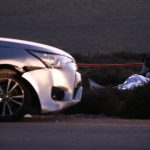Wednesday, January 20, 2021 20:19 On December 21, 2020, Ahuvia Sandak, z”l, was tragically killed in a police car chase when the car he was in with four other boys overturned when the police car collided with it from behind. Honenu is representing those who are insisting on the investigation of his death and defending the many who are being detained while demonstrating for change in police behavior. Please see here for a list of relevant posts on the Honenu website.
Activists protesting Ahuvia’s death produced a video clip – “Making Sense of the Facts” – detailing the flaws in the investigation and the cover-up by the investigating authorities, including the Police Investigation Unit. The video clip is in Hebrew only, however all of the content is translated below.
Ori Kirshenbaum from Honenu, the narrator, opened the video clip: “For a month the country has been in an uproar over the death of Ahuvia Sandak, z”l, by policemen. The media has been spreading large amounts of disinformation and journalists are being briefed in a tendentious manner by senior officials in the law enforcement system. They are all working very hard to completely clear the policemen who are responsible for Ahuvia’s death. We are here to make sense of the facts.”
The opening describes the scene of the incident and the report from the traffic inspector who reenacted the accident. “We’ll start from the bottom line – the scene is obvious. A police car intentionally collided with the youths’ car during a chase on the access road to the Ba’al Hatzor Air Force Base. That is the final conclusion of the expert, the traffic inspector who was sent to the scene on behalf of the family immediately after the incident occurred.
“The expert opinion is based on a study of the scene, documentation of the findings, and examination of all of the data with precise scientific instruments. It is not an estimation. It is not based on rumors or fabricated testimonies, but rather on research and science.
“That is to say, if the investigators from the Police Investigation Unit (PIU) were honest with themselves and served the interests of the public, for whose sake the unit was founded, at the conclusion of the investigation the Attorney General’s office should be given a clear recommendation to put the policemen on trial for negligent homicide, what had been called manslaughter.
“However our feelings, and those of the public, are very hard. It seems like no-one in the law enforcement system is looking for justice. From the first moment the police made efforts to cover up [their guilt]. The police spokespersons have consistently concealed the collision and treated the overturning of the youths’ car as if it happened independently [of the police car]. (At 1:17, highlighted in the image shown, a police report describes an “overturned car at Rimonim Junction”.)
“Also at the court deliberations during the proceedings concerning the remand of the youths who survived the accident, the police talked about ‘loss of control’ of the youths’ car, without any mention of the collision. And thus maliciously misled the court. If it weren’t for civilians who managed to reach the scene and document the impact marks on the police car, it is doubtful that we would have ever known about the collision.
“Regarding arrival at the scene, for many hours the police completely closed the area and even attorneys were forbidden entry. Also Knesset Member [Betzalel] Smotrich was blocked.
“One would expect the PIU to do their work, to throw their entire weight behind the investigation, as befits a case of this importance. However the reality did not meet the expectations. The policemen suspected of causing death were not summoned to interrogation for three days and even when they arrived at the PIU offices accompanied by their attorneys they were sent straight home, because PIU head Keren Bar-Menachem thought that it was unnecessary to interrogate them. During those days the policemen were not prevented from contacting other people involved with the incident and those with access to the objective findings which could verify the claims against them. What is done in every case – detaining suspects, orders prohibiting making contact, at least house arrest – simply did not happen here.
“The PIU did not find it correct to even distance the policemen from their unit. And then the high point came. Everything that we knew and sensed throughout the investigation was written, black on white, in a letter sent by the Deputy Director of the PIU, Moshe Sa’ada, to the Deputy Attorney General for Criminal Affairs, Shlomo (Mumi) Lemberger, and publicized in the media.
“Attorney Sa’ada was shocked by every detail of the investigation and complained that decisions were not being professionally made and that the opinions of senior PIU officials were not being heard regarding the investigation. Sa’ada pointed an accusatory finger at the head of the PIU, Attorney Keren Bar-Menachem. Sa’ada also pointed out that the severe charges of disruption of the investigation by the policemen did not receive any attention from the PIU investigators. Tell me, are any of you able to put any trust in this unit?!”
In conclusion, “We have not yet talked about the head of the police investigation team, who called the policemen ‘the salt of the earth’ who ‘strove to make contact’ [an expression closely associated with charging at enemy forces] – a statement which drew criticism from representatives of the Attorney General’s office at a Supreme Court deliberation, but more than anything else indicates the mood of this investigation.
“Therefore we are here to reiterate that we have not fallen asleep on the job. Ahuvia deserves justice, his family deserves justice, and Am Yisrael, who is crying out over the injustice, deserves justice.”


